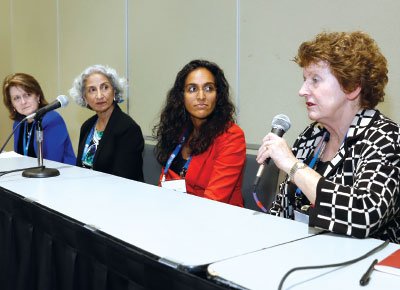How to Develop a Global Mental Health Program
Abstract
An understanding that change takes time and that incremental steps are needed are keys to developing a sustainable mental health campaign in low-income nations.
Many studies have shown that improved mental health is a key driver of economic development because it restores people’s ability to work productively. Fostering economic growth is especially important in low-income nations, and numerous global organizations including the World Health Organization (WHO) and World Bank have recently made global mental health care a priority.
Many mental health professionals in the United States may be interested in contributing to global mental health efforts but are not familiar with the logistics. At this year’s APA Annual Meeting in San Francisco, individuals with experience in global mental health discussed their efforts and highlighted some keys to building successful and sustainable programs.

Though psychiatrists who work with groups in low-income countries are there to provide services and knowledge, they can learn things as well, such as the value of community, says World Psychiatric Association President Helen Herrman, M.D.
Presenters included Geetha Jayaram, M.D., M.B.A., an associate professor of psychiatry and behavioral sciences at the Johns Hopkins School of Medicine who helped established a community mental health clinic in the Indian village of Mugalur; Christina Khan, M.D., Ph.D., a clinical assistant professor of psychiatry and behavioral sciences at Stanford University who is bringing mental health training to community health workers in Guatemala’s Lake Atitlan region; Mary Kay Smith, M.D., who has been involved in training pastors in Zambia to educate their communities about mental health and HIV prevention; and Helen Herrman, M.D., president of the World Psychiatric Association.
The presenters’ projects spanned diverse communities across the globe, but several consistent themes emerged during their discussions.
The first is that these global initiatives require partnerships. International organizations like WHO are important, but local groups are just as important. In Jayaram’s case, she partnered with Rotary International as well as a local rotary club and a local hospital in Bangalore. Khan likewise made several preliminary trips to Lake Atitlan to familiarize herself with the staff at the local health clinics and her on-the-ground partner ALAS Pro Salud Mental, a nongovernmental organization committed to bringing mental health care to the people of Guatemala.
Importantly, these efforts require perseverance. “Building these partnerships takes time, sometimes years,” Khan cautioned.
The time it takes to build such relationships can be beneficial, as it allows the psychiatrist to learn the local culture and customs, according to the presenters. Smith noted in her talk that her first couple of trips to Africa resulted in some progress with the local pastors, but they were still hesitant. Then she learned the importance of storytelling in village culture. Once she adapted her curriculum to include more narrative elements, such as role playing, it took off.
Another important element in building a successful mental health program in another country is taking steps to empower the women in these communities. Getting buy-in from village leaders, who are typically men, is necessary, but the speakers argued that the women are the backbone of these small communities. The speakers also noted that developing an international project requires changing roles. “You become more a public health practitioner rather than a clinician,” which results in greater attention to building capacity in the clinic, supervising staff, and establishing a referral network so patients can be quickly shifted to appropriate care services, Khan explained.
Finally, “It’s also critical to prioritize care and pick feasible outcomes,” Jayaram added. These communities often have tremendous need, but psychiatrists should not try to do too much too soon. With the right mindset, global mental health programs can bring about positive change. As one example, Khan noted that before she started the collaboration with ALAS Pro Salud Mental, there were no community-level mental health services in Guatemala. However, after seeing some of the mental health improvements among people in the Lake Atitlan region, the national health department allocated resources to provide one trained psychologist for each region of the country. It’s a change that’s both small (for a country of 17 million), but also significant.
Knowledge gained from global mental health initiatives may also be applied in programs in the United States and other western countries, noted Herrman in her summary remarks. “We can learn a lot about hospitality and the sense of community from these countries,” she said. “These are valuable assets when conducting a public health campaign.” ■



